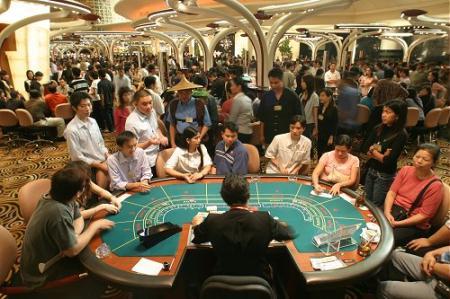The Gaming Industry -- Macao's largest income
2009-11-30 15:07 BJT
Gaming industry has a long history in Macao and it was first legalised in mid 19th century. Entering the 21st century, the gaming industry has developed a very close relation with the tourism industry and become a pillar of Macao's economy. It has also earned Macao an appellation of "Monte Carlo of the Orient".
In the fourth quarter of 2008, the gross revenue of the gaming sector amounted to MOP24.36 billion (USD3.05 billion). The sector contributed MOP41.90 billion (USD5.24 billion) in direct tax to the MSAR in 2008.
 |
| Entering the 21st century, the gaming industry has developed a very close relation with the tourism industry and become a pillar of Macao's economy. It has also earned Macao an appellation of "Monte Carlo of the Orient". |
From Monopoly to Liberalisation
In 1962, the Sociedade de Turismo e Diversoes de Macau (STDM) was granted the casino concession. After a number of extensions, the monopoly expired on 31 December 2001. Under the contract, STDM paid a gaming tax to the Government annually. In 2001, the tax rate, which had been amended several times, was 31.8% of the total revenue of the concessionaire. In the 1990s, half of the Government’s annual income came from gaming tax, which accounted for one-third of total GDP. In the last few years of STDM’s monopoly, the company’s gross gaming revenue varied from MOP13 billion to MOP18 billion and the gaming tax from MOP4.2 billion to MOP5.9 billion.
Other than casino table games, gaming activities in Macao also include horse-racing, greyhound-racing and pacapio lottery. Instant lotteries and soccer betting are becoming increasingly popular in recent years.
After its establishment, the Government of the Macao Special Administrative Region (MSAR) decided to liberalise the gaming industry once the STDM concession expired. The Government’s objectives were to introduce competition in the industry, increase employment and consolidate Macao’s position as a gaming centre in the region.
As the gaming industry played such a crucial role in Macao’s economy, the whole process of liberalisation, including the establishment of an advisory committee to study the development of the gaming industry, the appointment of a consultancy firm for more in-depth research and the introduction of relevant laws, by-laws and bidding procedures, was conducted prudently.

 Mail
Mail Share
Share Print
Print


 Video
Video









 2009 China Central Television. All Rights Reserved
2009 China Central Television. All Rights Reserved